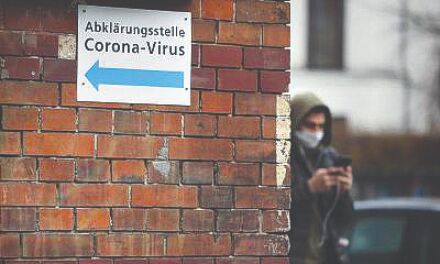Tough weeks ahead with rising cases: Germany

Berlin: Germany's health minister says the country should prepare for several very challenging weeks amid a rise in Coronavirus cases.
Health Minister Jens Spahn told reporters in Berlin on Friday that the situation remains tense, as the country's disease control center reported 12,834 newly confirmed cases in the past day, and 252 new COVID-related deaths.
The head of the agency, Lothar Wieler, said Germany is at the beginning of the third wave of infections following surges in cases last spring and in the fall.
Spahn noted there has been a drop in serious illnesses and deaths among the elderly, as most people over 80 in Germany have now received a virus vaccine.
He said Germany has managed to administer more than 200,000 first shots daily this week.
As more supplies arrive, shots will be administered not just in special vaccine centers but, from mid-April, also in doctors' practices, said Spahn.
Meanwhile, Spahn also expressed regret Friday that some neighbouring countries have paused their use of AstraZeneca's Coronavirus vaccine following reports of blood clots in some people, despite the lack of any evidence the shot was responsible.
Spahn said that while Germany takes reports of possible side effects from vaccines very, very seriously, both the European Medicines Agency and Germany's own vaccine oversight body have said they have no evidence of an increase in dangerous blood clots in connection with the shots.
I regret that on the basis of the knowledge of Friday morning some countries in the European Union have suspended vaccinations with AstraZeneca, Spahn told reporters in Berlin.
Denmark was the first to temporarily suspended use of the AstraZeneca vaccine Thursday after reports of blood clots in some people. The Nordic nation's health authority said the decision was based on a precautionary principle and that one person who developed a blood clot after vaccination had died.
Norway decided to follow suit and halted use of the Anglo-Swedish company's vaccine, which was developed with the University of Oxford. Italy's pharmaceutical agency on Thursday ordered a precautionary ban on a particular batch of the vaccine after what it said were serious adverse events. The European Medicines Agency, which approved the shot for use across the 27-nation EU, Iceland, Liechtenstein and Norway, said the vaccine's benefits continue to outweigh its risks and the vaccine can continue to be administered while a closer evaluation of the blood clot cases continues.
There is currently no indication that vaccination has caused these conditions, the regulator said. It said the number of people with blood clots in vaccinated people was no higher than those who hadn't been inoculated.
Spahn, the German health minister, said there was no evidence so far of a causal link between the blood clots and the vaccinations, adding that it was important to strike a balance ... between being vigilant and not causing alarm.
Other health experts pointed out that the people most likely to get vaccinated against COVID-19 are also more likely to have other health problems, which could put them at higher risk for blood clots. Britain's medicines regulator said it had not received any reports of blood clots in people that were caused by the AstraZeneca vaccine. More than 11 million doses of AstraZeneca have been administered in the UK.



